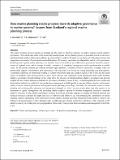Files in this item
Does marine planning enable progress towards adaptive governance of marine systems? Lessons from Scotland’s regional marine planning process
Item metadata
| dc.contributor.author | Greenhill, L | |
| dc.contributor.author | Stojanovic, Tim | |
| dc.contributor.author | Tett, P | |
| dc.date.accessioned | 2020-03-24T15:30:03Z | |
| dc.date.available | 2020-03-24T15:30:03Z | |
| dc.date.issued | 2020-03-24 | |
| dc.identifier | 266954189 | |
| dc.identifier | 2e122f07-e05f-46b1-aab9-d983e9e4fd53 | |
| dc.identifier | 85082800870 | |
| dc.identifier | 000521722800001 | |
| dc.identifier.citation | Greenhill , L , Stojanovic , T & Tett , P 2020 , ' Does marine planning enable progress towards adaptive governance of marine systems? Lessons from Scotland’s regional marine planning process ' , Maritime Studies , vol. First Online . https://doi.org/10.1007/s40152-020-00171-5 | en |
| dc.identifier.issn | 2212-9790 | |
| dc.identifier.other | ORCID: /0000-0002-8936-2299/work/71221417 | |
| dc.identifier.uri | https://hdl.handle.net/10023/19701 | |
| dc.description | Paul Tett was partly funded by H2020 project no. 774426, ‘The Blue Growth Farm’. | en |
| dc.description.abstract | This paper examines marine planning in Scotland and the extent to which it constrains or enables change towards adaptive governance. An in-depth case study of the partnership-based regional marine planning process is presented, based on interviews and documentary analysis. Drawing on adaptive governance theory, analysis focussed on key themes of: (1) local governance and integration across scales; (2) participation and collaboration; (3) learning, innovation and adaptability; and (4) self-organisation. Results present regional marine planning as an interface between hierarchical and collaborative governance based on empowerment of regional actors, and an attempt to enable co-existence of ‘top-down’ arrangements with experimentation at smaller scales. In this system, national government provides legal legitimacy, economic incentives and policy oversight; while the partnerships support collaboration and innovation at the regional level, based on strong leadership and participation. Contrasting experience of partnership-working is evident between the large and complex region of the Clyde and the island region of Shetland, where devolved powers and a more cohesive and community-based stakeholder group better facilitate adaptive governance. Overall findings of the study show the tensions of institutionalising adaptive governance and provide insights into how marine planning contributes to governance of marine systems. Firstly, vertical integration between central and decentralised authority in multi-level marine planning arrangements is challenged by an unclear balance of power and accountability between national government and regional marine planning partnerships. Secondly, the interaction between marine planning and existing policy, planning and management emerged as critical, because marine plans may only operate as an instrument to ‘guide’ management and prevailing, limited adaptive capacity in broader management structures constrains adaptive outcomes. Lastly, adaptive governance requires incremental and rapid response to change, but limited financial and technical resources constrain the depth and scale of reflection and ability to act. Understanding the contribution of marine planning requires clarification of the interaction between marine planning and other management (the extent to which it can influence decision-making in other domains) and, in addressing governance deficiencies, attention is also required on the adaptive capacity of existing and emerging legislative frameworks which govern decision-making and management of activities at sea. | |
| dc.format.extent | 17 | |
| dc.format.extent | 493803 | |
| dc.language.iso | eng | |
| dc.relation.ispartof | Maritime Studies | en |
| dc.subject | Regional marine planning | en |
| dc.subject | Local governance | en |
| dc.subject | Marine spatial planning | en |
| dc.subject | Adaptive governance | en |
| dc.subject | G Geography (General) | en |
| dc.subject | NDAS | en |
| dc.subject | SDG 14 - Life Below Water | en |
| dc.subject.lcc | G1 | en |
| dc.title | Does marine planning enable progress towards adaptive governance of marine systems? Lessons from Scotland’s regional marine planning process | en |
| dc.type | Journal article | en |
| dc.contributor.institution | University of St Andrews. School of Geography & Sustainable Development | en |
| dc.contributor.institution | University of St Andrews. Scottish Oceans Institute | en |
| dc.contributor.institution | University of St Andrews. St Andrews Sustainability Institute | en |
| dc.contributor.institution | University of St Andrews. Coastal Resources Management Group | en |
| dc.contributor.institution | University of St Andrews. Marine Alliance for Science & Technology Scotland | en |
| dc.identifier.doi | https://doi.org/10.1007/s40152-020-00171-5 | |
| dc.description.status | Peer reviewed | en |
This item appears in the following Collection(s)
Items in the St Andrews Research Repository are protected by copyright, with all rights reserved, unless otherwise indicated.

